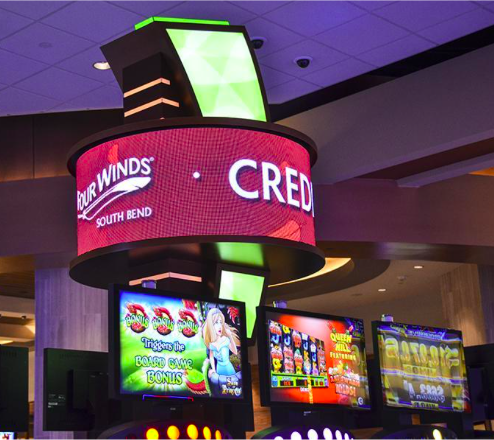You won’t have to go to Las Vegas anymore to place bets on your favorite sports team winning a championship, but AV integrators aren’t expecting Sin City to become a ghost town as a result on the recent Supreme Court ruling that allows states to decide if they want sports betting (and betting technology).
Much like the action at a Vegas card table during InfoComm 2018, expect the activity on sports gambling to be fast and furious—at least in a few states that already have legislation on the books, including New Jersey and Delaware. Connecticut, New York, Iowa, Pennsylvania, Mississippi and West Virginia are hoping to pass sports betting-targeted legislation during this session.
“In the last couple of months, there’s been a lot of visiting and speculating on options,” says Ken Newbury, senior VP of operations at McCann Systems.
“We’ve been doing some design work to get ahead of the betting technology curve and we had one job in New Jersey that went green immediately after the [Supreme Court] announcement. It’s going to be wild how quickly things happen. [related]
“It’s going to be fun to watch Atlantic City. It could be the beginning of the rebirth of that city. This ruling opens a market we already feel we’re strong in and allows us to work outside of Las Vegas. It breeds new competition as well,” he says.
Lance Hutchinson, VP and leader of Alpha Video and Audio’s casino and digital signage work, expects to have myriad opportunities with existing and new clients to install LEDs, suites and loge seating at existing casinos now that the Supreme Court has spoken.
He knows of a project in New Jersey that will cost $2.2 million to enhance its AV as part of a $7 million renovation.
“Every casino operator is going to be looking to do something like that,” says Hutchinson.
“We’re talking about more than a dozen projects across the country.” About 25 percent of Alpha’s business is in gaming and casinos, stadiums and gaming make up about half of the company’s overall revenue, a percentage that could certainly increase with this ruling.
SVT has continued contact and conversation with its clients in all markets, says VP of sales and marketing Linda Civitillo, so she doesn’t expect a rush of new revenue as a result of the Supreme Court decision.
Casino jobs, she says, include infrastructure improvements to drive signals and large-scale displays, among other AV improvements.
“These projects are definitely not going to proliferate at the flip of a switch,” says Josh Shanahan, president and CEO of SVT. Most casinos aren’t set up for paramutual gaming today, he says, meaning there’s more red tape and approval needed before any bets are placed.
“That’ll offer up some challenges way before audio and video,” says Shanahan. “A lot of these facilities don’t have the real estate to support sports books.”
How Quickly Will Sports Betting Spread?
Newbury expects the adoption of casino gambling laws to be similar to the state-by-state laws related to marijuana. He also cautions those who expect the U.S. to become awash in neon now that the Supreme Court allows casino gambling to lower their expectations.
“The reality is not everything is a big job,” he says. “You’re talking about everything from a 200-square-foot kiosk to a 300,000-square-foot casino and everything in between.” Newbury expects McCann’s revenue from casino projects to grow about 5 percent this year, with some spots targeting the 2018 NFL season in September to open their betting operations.
That could mean a busy summer for McCann Systems and other integrators hoping to quickly capitalize on the new legislation. The other prime target, says Newbury, is March Madness, which means the AV work starts in December to be ready for NCAA tournament time.
As for the timing of these AV installations, “it’s probably not going to happen this year,” says Civitillo.
“That doesn’t mean we have a lot of time,” she says.
“It’s essential for us to be ready, to be educated and to be the experts our customers expect us to be.” Gaming represents about 25 percent of SVT’s overall revenue, says Shanahan. He expects most of the casino and gaming jobs related to sports betting technology to be in the $750,000 to $1 million range.
“Our customers are looking for ways to bring in more people, more young people, and the nature of the solutions we provide help them to do that,” says Civitillo. “That’s why we’re having these conversations with them. Somebody always wants something done yesterday. The pressure is always going to be there for us to get it done.”
Some states may move more quickly to help casino or sports betting entities launch apps, while some casino operators may want all bets to be placed within the confines of their buildings, says Hutchinson.
He expects “at least a dozen states” to have sports betting technology within a year and 20 to 25 states with legislation in place by the end of 2019. Some states—such as Texas, Utah and Kentucky—will never allow sports betting, he says.
“Operators will be looking to create immersive experiences around sports betting,” says Hutchinson. “That means allowing them to watch live sports, stream to their devices and make live bets on their mobile devices.”
Sports Betting Technology In Stadiums?
Maybe this will mean an opportunity in sports stadiums for integrators who install digital signage, although many leagues have been quick to distance themselves publicly from the Supreme Court’s ruling for fear of looking like they support the gambling they know has been happening on their sports illegally for years.
With the Vegas Golden Knights already in Sin City and the Oakland Raiders relocating soon to Las Vegas, clearly the lines between sports and gambling are already decidedly blurred in two major professional sports. Some team owners also own casinos too, says Shanahan.
“It’s about creating a cool technological experience you can’t get anywhere else,” says Hutchinson.
Competitors in Casino Space
As for the new competitors who will surely take a gamble on casino projects now that the market has opened up, Newbury cautions his future competitors it’s not as easy as they probably think.
“You’re talking about a very specialized system and, if that system goes down, that’s lost revenue for as long as it doesn’t work,” he says. McCann Systems approaches casino and gaming work like a command and control operation, with multiple redundancies to prevent failures.
“I’m sure there will be people wanting to chase this,” says Hutchinson, noting Alpha Video has 20 years of experience in the casino and gaming space. “We’ve been in the space for so long, so we’ll be able to defend it. You can’t just do business with a company because you want the job. Casinos are very different than anything else. Every day they stay out of service is revenue lost.”
“You can’t just jump into the market,” says Shanahan. “Native American casinos tend to be less regulated but the commercial casinos literally require a three-inch submission that’s very invasive, back to when you were born, your bank account routing number and interviews with your neighbors and friends.
“You might find people rushing to embrace the opportunity but they’ll find a large barrier to entry. The process is very long, very tedious and can be very expensive,” he says. It’s also important for integrators to be up to date on the latest IP protocols in the casino space, he says.
“You need to have a very focused, very aggressive approach and be in it for the long haul,” says Civitillo.
Will More Sports Betting Technology Hurt Vegas?
Newbury expects the Supreme Court ruling to not only help states outside Nevada, but to also give a jolt to Las Vegas casinos to update their systems and perhaps bring more action to Reno.
“Vegas has been getting pretty stale,” says Newbury. “There’s a huge push to renovate in a lot of those properties because so many of them are getting so dated.”
Hutchinson agrees that no one needs to weep for the future of Las Vegas in the wake of the Supreme Court’s ruling on sports betting.
“Las Vegas has always found a way to reinvent itself,” he says.
“The entertainment business is very unique,” says Shanahan. “There’s a tremendous amount of money in it and people with disposable income who are looking to maximize their entertainment value. We can’t disrupt that with the work we’re doing.”
“Las Vegas is an experience and a destination,” says Civitillo. “They already know how to do [sports betting technology] so they might benefit from this as others look to them to try to do the same thing in their states.”






































